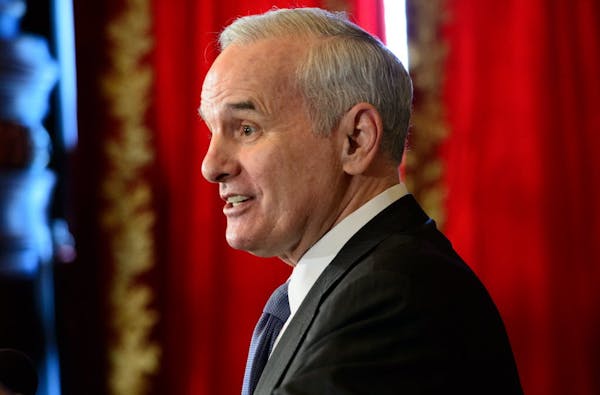Nearly half of the tax cuts Gov. Mark Dayton proposed Thursday are for businesses and their owners, a move that may reduce the anti-business criticism that has dogged him.
Dayton proposed — and the House almost immediately passed — eliminating three business-sales taxes that accounted for $232 million in his overall $616 million in tax cuts.
He also asked lawmakers to simplify and raise the estate tax deduction to $2 million from $1 million and to eliminate the gift tax, a 10 percent levy on any personal gift above $1 million. Those moves would cut $43 million in taxes, bringing the combined cut on businesses and the wealthy to $275 million, or 44 percent of the total.
Minnesota Revenue Commissioner Myron Frans said in an interview that the gift tax, created just last year, was particularly seen as unfair.
"Only one other state, Connecticut, has a gift tax, and they are talking about eliminating it," Frans said. "We want taxes to be fair, whether on low-income or high-income people. And the gift tax didn't make sense, and it's complicated and caused consternation."
The estate tax and gift tax changes last year fueled discussion of avoidance strategies by affluent Minnesotans, estate lawyers and tax advisers. Some lawyers and accountants held seminars for clients that promoted establishing residency in other states.
Two prominent critics of those taxes — Hunt Greene, a Minneapolis businessman, and Bob Abdo, a Minneapolis business lawyer — said Thursday that Dayton's proposals were steps in the right direction.
"It sounds like the governor figured it out," Greene said. "I hope this is a shoo-in with the Legislature. I haven't done a survey, but this will make a big difference in people staying in Minnesota."
Dayton proposed lifting from $1 million to $2 million the amount of estates that can pass from generation to generation without taxation, plus other measures that would also eliminate a "bubble," partly owing to federal law, that effectively taxes the first $100,000 in an estate that is subject to taxes at up to 41 percent and a declining rate after that.
Some critics have urged Minnesota to conform with recent federal tax law that raised the exemption to about $5.25 million. But Frans said this is a "first step" toward federal conformity that eliminates the bubble tax for Minnesotans and it's what the state could afford at this point.
Meanwhile, the Minnesota Chamber of Commerce had made repeal of the three business-sales taxes a priority for the current legislative session. Bill Blazar, a chamber executive, said the state's largest business lobby was pleased to see the House's quick action.
"We ask Senate Majority Leader Tom Bakk and members of his caucus to join ranks and act quickly to repeal the three taxes by April 1 before they do any more damage to jobs and businesses," Blazar said in a statement.
The sales taxes, which were passed last year, include labor service charges for repair of business equipment, purchases of equipment by telecommunications providers and one on independent warehouse owners.
Neal St. Anthony • 612-673-7144

